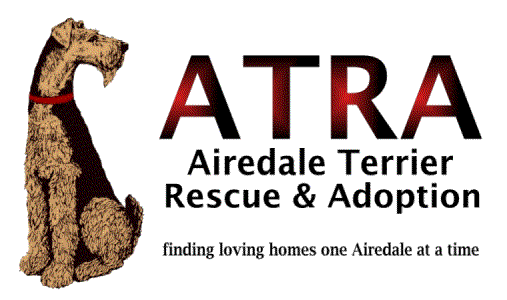From a Foster Mom
 Prior to my involvement in ATRA, my husband and I had two Airedales in our lives, Cinnamon and Georgia. The two of them went everywhere with us and we always considered them our very special furkids. Six years ago our storybook life with our dales came to a sad end when our Cinnamon died from cancer. We felt Georgia needed a buddy so we ended up surfing the web one evening and came across ATRA’s website. Both of us looked at each other and said “who could possibly give up their Airedale?”
Prior to my involvement in ATRA, my husband and I had two Airedales in our lives, Cinnamon and Georgia. The two of them went everywhere with us and we always considered them our very special furkids. Six years ago our storybook life with our dales came to a sad end when our Cinnamon died from cancer. We felt Georgia needed a buddy so we ended up surfing the web one evening and came across ATRA’s website. Both of us looked at each other and said “who could possibly give up their Airedale?”
Well sadly, many people do for various reasons and that is where ATRA volunteers come in to the picture. We are similar to what America’s Statue of Liberty stands for; give us your tired, your old, your young, your uncared for, unkept, dirty, skinny, plump, sick and unwanted Airedales. We take them all in and try to give them a new “leash” on life. That is where foster families come into the picture. We as an organization don’t have a kennel or a shelter facility like humane societies have. But we also have an advantage in not having those types of facilities-we are able to work one on one with our new Airedales that have lost their home in a home environment. This kind of care and love helps many of them to come out of their shell. They learn that people can be of help to them, to love them, to care for them and make them feel like an Airedale again. Many of them come into rescue with most of their Airedale spirit gone which is so heartbreaking to see. But if you give yourself the opportunity to renew that tenacity and that spirit again you will be so proud of your foster dale and so happy for them. Your heart will also mend from all the joy you see in your foster dale’s eyes and smile. Your investment is your love and time. ATRA will cover the vet expenses, training, food and other necessary expenses to help with a foster dale in a home.
Jim and I will be the first to tell all of you that it is not easy letting any of them go onto their new lives. What makes it possible though is the fact that you helped save a life, a soul that was not wanted and is now wanted and loved again by a family. It is so thrilling to get an email or a letter in the mail with pictures of showing how much more he/she has blossomed. We have made many new friends over the past six years that continue to keep in touch with us and let us know how their new pal is. Many contact us again to say they are ready for another rescue dale in their life. Remember, nothing in life worth having comes easy...please look beyond yourself and open up your heart and home to an unwanted dale. Just look to your left and see where the "Rescue Network" is located and click on it. Find your state and contact your coordinator to get started on becoming a foster family.
-- Jim & Paula Lackner
Answers to Questions on Fostering
Why become a foster home?
Good foster homes make an incredible difference in rescue. They provide a warm, safe and loving environment – many times for the first time in a rescue Airedale’s life. They show a rescue Airedale that people can be kind and food and water are plentiful. A foster family teaches a rescue Airedale the ropes of living as a household family member. They evaluate a rescue Airedale as to how they get along with other dogs, cats, kids and every day living. They work with other ATRA volunteers to find the best home possible for a rescue Airedale and send them on their way to their new life.
Without foster families to do all of this for our rescue Airedales, our success rate at placing them in forever homes would not be as high. Sure, fostering involves a time commitment and a piece of our heart goes with each rescue Airedale placed, but it is one of the most important and rewarding parts of rescue you can do. The phone calls and e-mails from the adoptive home sharing new first experiences and photos of happy faces make it all worthwhile.
How do I qualify to be a foster home?
You have taken the first step by saying you are interested! Let’s go from here.
All of our foster homes go through the same screening process as a prospective adopter. They fill out an application, have references checked and receive a home visit. If you are already an ATRA adopter who has gone through this process, you need not do it again. However, if something has changed in your situation since your application, you should make us aware of it. You also need to consider the pets currently living in your home. They should be able to accept an unfamiliar dog coming into their living space.
After becoming an approved home, you will need to sign an ATRA Volunteer Agreement.
What do I need to know?
First of all, you should be Airedale experienced. In other words, you have owned an Airedale. Knowing and living with the breed helps you to understand some of their personality traits and prepares you for what to expect. You also need to understand safety issues involved with rescue Airedales. They are often times adult dogs in unfamiliar surroundings, frightened and liable to bolt and run away at every opportunity. You will need to make every effort to keep the dog safe!
ATRA has literature for you to read concerning how to introduce your foster to other dogs or animals in your household. This should help make introductions with your family dogs go smoother and help ease territorial issues. We also have books to give our foster families to help them with understanding dog psychology and temperament. We encourage you to read them.
Your foster should have a new collar and leash as well as an ATRA tag provided by your state coordinator. The collar and tags should be kept on the dog at all times.
What will my foster be like?
Some of our rescue Airedales come into rescue groomed, spayed/neutered and up to date on shots. However, this is not the norm. The rescue Airedale usually needs to have a wellness vet check and shots in addition to being bathed and groomed. They may also need to be spayed/neutered and have medical issues taken care of. All of this can be done before your foster comes to you unless you would prefer to help ATRA and handle some of this yourself (you are not expected to pay for it).
Your new foster may come with some behavior issues. We try as much as possible to learn what we can about the Airedale from previous owners, but many times getting information is just not possible. Some Airedales may need to be housebroken. Even if they are housebroken, they may have mistakes in the house until they get used to your routine. Talk to your state coordinator about what you can handle with your foster. We try the best we can to work within your boundaries.
Who pays the bills?
ATRA pays all of the bills related to our rescue Airedales. This would include vet expenses, medications and grooming in addition to things like a crate or baby gates, obedience classes and dog food. Most of our foster homes will donate food and some of the other expenses. If you do, let us know and we can give you a receipt for your taxes as we are a 501(c)(3) organization.
If you need to take your foster to the vet, contact ATRA’s treasurer and they will get a credit card number to the vet. Please ask your vet for a discount for rescue if possible. ATRA has reimbursement forms for any out of pocket expenses. Your state coordinator can help you if you are not sure what is covered. Checks are issued promptly.
Now that I have him, what do I do?
While the dog is in foster care, it’s important for the foster home to observe and evaluate the Airedale. Does he have any house manners? Does he get along well with other dogs, cats, etc.? Will this dog require serious obedience training or does he respond to basic commands? Does he walk well on a leash? Are car rides enjoyable or a nightmare? Does he dig, try to escape, bark excessively, etc.? Foster homes should be willing to set limits for the dog. See how he reacts to being crated or gated when alone. Is he responsive to commands? Is he happy? Does he cringe when verbally corrected? Any and all observations assist us in determining who the best prospect might be to adopt your foster.
Give your foster as many different experiences as you can. Take them for a walk in town. Have a friend come over to visit. It is important to know how the foster behaves in different situations. Finding out that the foster reacts strongly to men with beards, is terrified of vacuum cleaners, or anxious around small children will also help ATRA find the perfect home.
Remember that you are preparing your foster for life with another family. You never know what that life will be like, so teach your foster things like how to stay off the furniture and to wait patiently for meals. Find out how your foster lets you know they need to go outside. And most important, give them lots of love and understanding.
What if there are behavior issues?
If your foster is showing signs of aggression or any other behavior problem, contact your state coordinator. They need to know there is an issue. If you feel you can handle it and help the foster improve, we will be happy to work with you. If you need help, your state coordinator knows of trainers and behaviorists who can help. If you feel you cannot handle the behavior issue on your own even with the help of professionals, your state coordinator can step in to take the Airedale and place them with a trainer for a while or with another more experienced foster home.
How long will I have my foster?
Time in foster care is time well spent for many dogs. A good rule of thumb is no less than one week in foster care. Usually we prefer two weeks. You may be tempted to move a dog more quickly, but remember the placement you select will likely be your foster’s home for the rest of his life. Hasty, convenient placements often backfire and the dog gets bounced again, or the home keeps the dog and is miserable with his behavior. We don’t promise your foster can be placed in two weeks. It takes as long as it takes to find the right match for each dog.
It has been our experience that the two week mark is often the end of the “adjustment” period and the foster’s behavior may change. They are starting to feel comfortable in your home with your routine and begin to act more like their usual self. This is why we recommend at least two weeks in foster care.
Can I participate in the placement?
Most definitely! Your state coordinator will be receiving and screening applications for adoption. When they have approved applicants who might be a good fit, they will share the application and home visit information with you. You are encouraged to talk with the prospective adopter yourself and even meet with them to see how they interact with your foster. You can be as involved as you would like to be in the placement of your foster.
One important thing to remember is that neither the foster family nor the state coordinator should be placing the Airedale independently. Each should be communicating with the other throughout the process. If you do decide to meet with a potential adopter, do not promise them your foster dog. Talk over your visit with the state coordinator afterwards and go from there. There are lots of paperwork and procedures involved that the state coordinator needs to handle before an adoption can become final.
What about paperwork?
You will be the keeper of your foster’s vet records and occasionally some additional paperwork. Keep this all together so that you can pass on appropriate papers to the new adopter. You will also be asked to fill out a Foster Home Report for the new family so that they can know as much as possible about your foster and make his transition easier.
Can I adopt my foster?
Yes you can. As much as we hate to lose a good foster home, we realize that sometimes you will bond with a particular foster. Just let your state coordinator know of this so they can take care of the paperwork and procedures to make the placement permanent.
What happens if the placement fails?
We hope this never happens, but in reality, it sometimes does. If so, you will be the first person contacted to see if you are in a position to take your foster back while we look for a new home.
How do I sign up?
Go to the "ATRA Officers Link" and let them know how you would like to help. They will be thrilled to hear from you and will help you get started volunteering for ATRA
Click on the "Foster Pamphlet" below to get a pdf file of the discussion above on what it takes to become a foster family in a tri-fold format.
If you think you might be interested to see the requirements click here.















